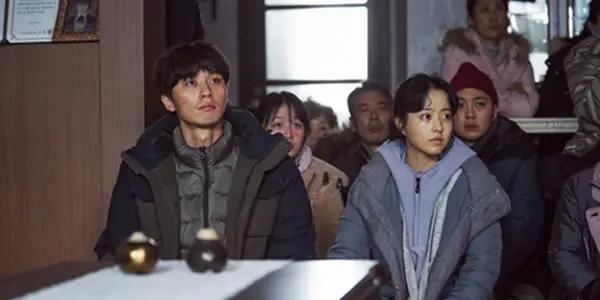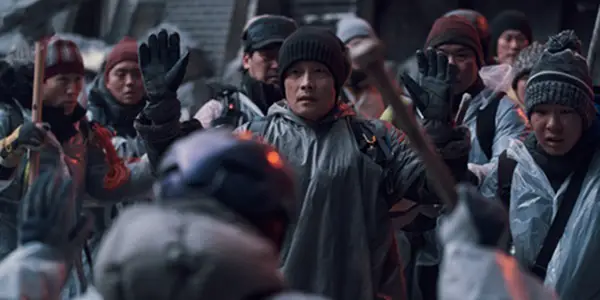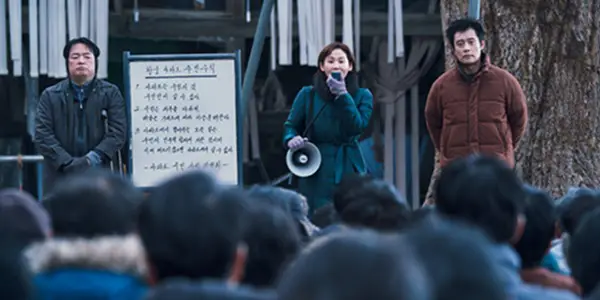CONCRETE UTOPIA: Our Own Worst Enemy

Lee Jutton has directed short films starring a killer toaster,…
At a superficial glance, Concrete Utopia seems like an unusual choice to be South Korea’s official submission for Best International Film at this year’s Academy Awards. The first feature in seven years from director Um Tae-hwa (Vanishing Time: A Boy Who Returned), it’s a bloody dystopian thriller that chronicles the desperate struggle for survival surrounding the last apartment building left standing in Seoul after a massive earthquake. But in using well-trodden genre tropes to explore all-too-real issues of class and status, Concrete Utopia stakes its claim as the heir apparent to Parasite and Squid Game and should have similar crossover appeal for international audiences. Whether that will translate into awards is another question altogether, though considering its compelling performances and visuals, it wouldn’t be undeserving.
At World’s End
Civil servant Min-seong (Park Seo-joon, What’s Wrong with Secretary Kim?) and his wife, nurse Myeong-hwa (Park Bo-young, Strong Girl Bong-soon), took out numerous loans to secure an apartment in the prestigious Hwang Gung Apartments complex. When a massive earthquake wipes out the rest of the city, their building is the last one standing, and all too quickly becomes a beacon of hope for those on the outside looking for a safe haven.

The compassionate Myeong-hwa is all too willing to welcome a mother and her young son into their home, though Min-seong is more reluctant to share their meager resources with total strangers. But that’s nothing compared to the violent reactions of the other residents, led by women’s association leader Geum-ae (Park Sun-young, Crash Landing on You), who don’t trust the outsiders who have entered the complex and think that only people who have paid for apartments in the building have earned the right to shelter there. In a world where money no longer carries any real meaning, these people cling to class privileges as the last vestiges of their regular, pre-dystopian lives; they refuse to accept a world in which they have been reduced to the same level as the poor and homeless suffering outside.
As this conflict simmers to a boil, the residents decide to elect a delegate to serve as the major decision-maker of the building. They land on Yeong-tak (Lee Byun-hun, Mr. Sunshine), who has already shown an ability to act quickly in a crisis. Yeong-tak leads the residents in kicking out the outsiders, drawing up a code of conduct for the building, and leading dangerous quests into the outside world to gather food and other necessary supplies, which are rationed out according to how much each resident contributes to the building’s survival.

Compared to life out in the bitter cold, where death is practically unavoidable, life in the Hwang Gung Apartments does seem almost utopian. But the residents’ borderline-blissful existence is soon threatened by dangers both inside and outside of the complex—including the growing power and influence of Yeong-tak, who may not be all that he seems.
Eat the Rich
The main strength of Concrete Utopia is its ensemble cast, which is jam-packed with some of the most recognizable faces in Korean entertainment. Lee Byun-hun gives what may be his best performance in an already illustrious career; his chameleonic acting ability renders Yeong-tak a figure both heroic and mysterious, sinister and strange. Park Bo-young, who plays kind-hearted Myeong-hwa, shows that in addition to the screwball comedy chops she’s exhibited in so many previous roles, she’s also a skilled dramatic actress. Her character is by far the most likable in the film, a gentle woman with a steely core who refuses to sacrifice her principles for her survival; her husband, on the other hand, is a bit milquetoast. That is no fault of Park Seo-joon, who does the best he can with the relatively two-dimensional character he has been given; Min-seong, who falls under the spell of the charismatic Yeong-tak and begins to take on some of his less-than-savory personality traits (much to Myeong-hwa’s chagrin), is just much more passive when compared with these other, bigger personalities. I would have liked to have seen more of this couple before the disaster, even in flashback, just so we could get a better idea of who they were both individually and together.

In addition to being filled with so many solid performances, Concrete Utopia also looks stellar, with the special effects and cinematography going a long way to make this dystopian world look and feel believable. With the vast majority of the story set within the apartment complex, there is a claustrophobic current running throughout the film that only adds to the already substantial tension. As characters peer at each other from across balconies, watching each other’s every move for anything that could be decried as suspicious, the Hwang Gung Apartments become a miniature surveillance state, one governed by strict rules that, if broken, could lead to a reduction in one’s rations or—even worse—ejection and almost certain death.
The script of Concrete Utopia, adapted by director Um and Lee Shin-ji from the second part of the webtoon Cheerful Outcast, echoes other works set in similar worlds in reminding us that the biggest threat to humanity’s survival tends to not be any outside factors, but other humans. Watching it, I couldn’t help but be reminded of The Walking Dead, and how depressing it was that more characters on that show seemed to be killed by other people than by zombies (which is also one of the main reasons why I stopped watching that show). It’s hard to come face to face with the knowledge that humans are all too willing to sacrifice each other in the name of survival, and are more likely to throw you to the wolves than shelter you from them—yet who among us is still naive enough to think that wouldn’t immediately happen in such a scenario? Who doesn’t think that the rich and privileged would refuse to share their resources with the rest of us, arguing that they’ve somehow “earned” them?
Conclusion
Yes, Concrete Utopia mostly hits on familiar themes, but it executes them so well—and with a healthy dash of the dark, satirical flavor that made Parasite and Squid Game so deliciously enjoyable—that you’ll easily find yourself not minding too much.
Have you seen Concrete Utopia? What did you think? Let us know in the comments below!
Concrete Utopia opens in New York and Los Angeles on December 8, 2023 and expands nationwide on December 15, 2023.
Does content like this matter to you?
Become a Member and support film journalism. Unlock access to all of Film Inquiry`s great articles. Join a community of like-minded readers who are passionate about cinema - get access to our private members Network, give back to independent filmmakers, and more.
Lee Jutton has directed short films starring a killer toaster, a killer Christmas tree, and a not-killer leopard. Her writing has appeared in publications such as Film School Rejects, Bitch: A Feminist Response to Pop Culture, Bitch Flicks, TV Fanatic, and Just Press Play. When not watching, making, or writing about films, she can usually be found on Twitter obsessing over soccer, BTS, and her cat.













